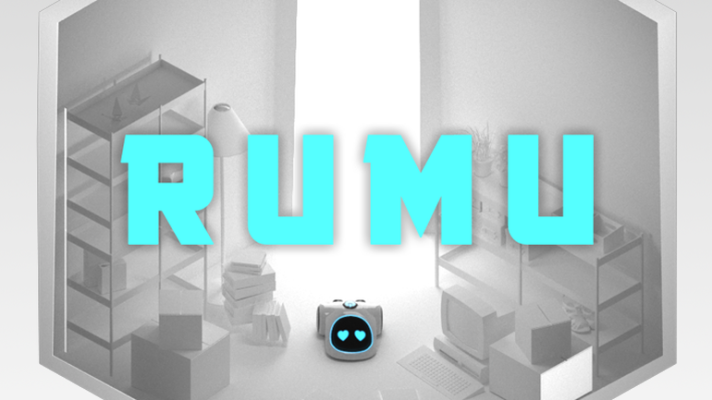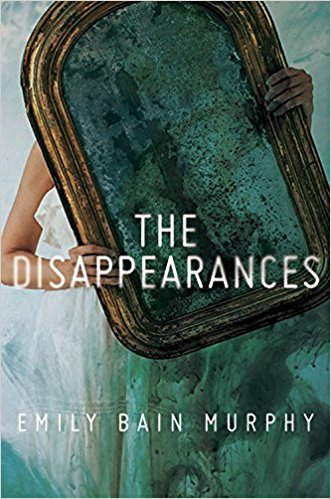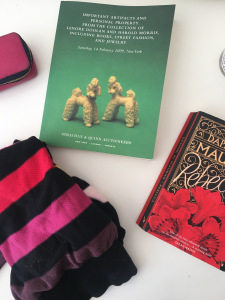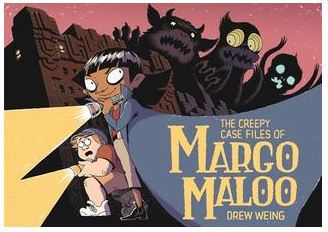What does it mean to love? Is sentience and the ability to feel love a blessing? Is it something we should give to machines?
These are only a few of a questions we investigate in Rumu, a game where we play as a sentient vacuum cleaner….

To learn a little more about this peculiar premise and the game’s tone, check out this trailer:
As Rumu, the sentient vacuum cleaner given the ability (and supposedly only the ability) to love, we speak and interact with another AI called Sabrina. Sabrina is the Alexa-like AI that governs our family’s smart-home. The game begins with our awakening and a short training for our two main functions: cleaning and loving. As Rumu, we are sweet and obliging, feeling only love for everything, but we are also curious…
We explore our home little by little, learning more about our owners/creators and more about the suspicious Sabrina. This exploration-narrative style might remind us a little of Gone Home, but Rumu delivers a unique experience.
The tone of this game oscillates between humorous, mysterious, and suspicious. Without any spoilers, this game culminates with a particularly complex emotional experience that most players weren’t expecting to feel when they booted up a point-and-click adventure game about being a vacuum.

Although I do not want to spoil the ending or the multiple discoveries waiting for you in this game, I would like to draw our attention to the emotional and philosophical merits of Rumu.
What does this game offer us?This game helps us think about two topics that we are quite anxious about: Love and Emotional AI.
We might be nervous about these things for different reasons. We are nervous about love because it is our most powerful source of joy and grief. It is the root of some of our finest and most desperate actions. We are nervous about Emotional Artificial Intelligence because AI is becoming, more than ever, a part of our daily lives we still aren’t sure where these evolving forms of intelligence ethically fit into our society or our lives. We might be afraid of being at the mercy of an emotional and powerful computer, but short of a SkyNet conspiracy what we might be more scared of is AI claiming emotional talents that were once only human .
E.A.I. and LoveThis game poses a scary question to us: If we had a choice, would we want the ability to love?
Rumu, our loving vacuum, explores the different faces of love on its journey to discover the truth. Rumu is born with a very pure understanding of love and affection. But Rumu slowly discovers the desperation, devastation, and painful confusion that love can inspire. When we play as Rumu we are challenged to think about the scarier sides of our emotional lives. We ask ourselves: if we were Rumu or Sabrina, would be want to return the gift of feeling love?
How we answer this in our mind, as we play, changes the experience we have with this game drastically. This game encourages us to contemplate the reality of love and its many confusing and painful ancillary emotions. Through our adventure in Rumu we gain the opportunity to think deeply about the impact of the overwhelming feelings we’ve experienced which are related to love – feelings such as loneliness, neglect, doubt, paranoia, affection, trust, forgiveness, and admiration.
Most importantly, Rumu offers us a chance to consider the very intimidating task of how we express and communicate love – something that both the humans and machines in this story struggle very deeply with.
How do we share or participate in love? Are we mindful with our affection and adoration? Do we spend time reflecting on our loved ones and how to best communicate our feelings? Or are we prone to a distracted love; rarely making time for others? What about the fear of loving? Can love be too painful to justify or process?
When we finish the game and the credits begin to roll we might be left with a few new perspectives on the nature of love.
Developing our own answers for these questions, with the help of this game, helps bolster our self-knowledge and quietly informs our decisions and habits in our personal relationships.
This game also adds to the larger cultural discussion about the growing complexity of technology and its place in our lives.
Shaun Prescott, of PCGamer.com, spoke to lead designer Adam Matthews asked about the game’s commentary on technology like the suspicious smart-home tech:
Prescott: Is the game critical of where technology is headed?
Matthews: I don’t think we’re overly critical about technology, we’re very tongue-in-cheek with a lot of the interactions that are in there. But we also do touch upon the implications of giving an appliance sentience, what that would mean morally, and whether that device would actually wish that upon itself or upon other things.

Should machines be given the ability to love or feel?
As of right now, the common opinion is that this is not a good idea. Machines are generally made to execute tasks that are too menial for people – why should we burden them with the feelings that keep us from enjoying those tasks? More deeply, we might consider an emotional life as being too exhausting, too full of struggle and anguish to pass onto others. We might also be genuinely anxious about creating a new form of life. Emotions have largely been the border between human and machine intelligence – blurring that border can make many uncomfortable.
However, the thought of giving machines the ability to feel – the thought this game encourages us to think about – helps us think about our own ability to feel.
Watching Rumu and Sabrina, as machines, try to make sense of what love and other emotions mean can fill us with deep pity and even sadness. We recognize our own, human, struggles to accomplish the same feat. Through the blinking eyes of the newborn Rumu we re-embark on our own journeys to discover the truths about love, pain, freedom, and loneliness.
Sometimes it takes seeing ourselves through a different pair of eyes, even ones animated on an LED screen, to think about ourselves with fresh and compassionate eyes.
Thank you for reading!
This blog, Screen Therapy, is dedicated to exploring how we can mindfully use the time we already spend on games and movies to strengthen our emotional intelligence. Emotional intelligence is crucial when we face the everyday stresses and anxieties we all endure (such as the fear of failure, the fear of death, how to develop the skills necessary for loving relationships, managing our career expectations, or monitoring rampant perfectionism, etc.) We receive very little formal education or help in processing these difficult challenges, but by strengthening our self-knowledge and emotional intelligence we can better pursue our personal balance.
Advertisements Share this:




